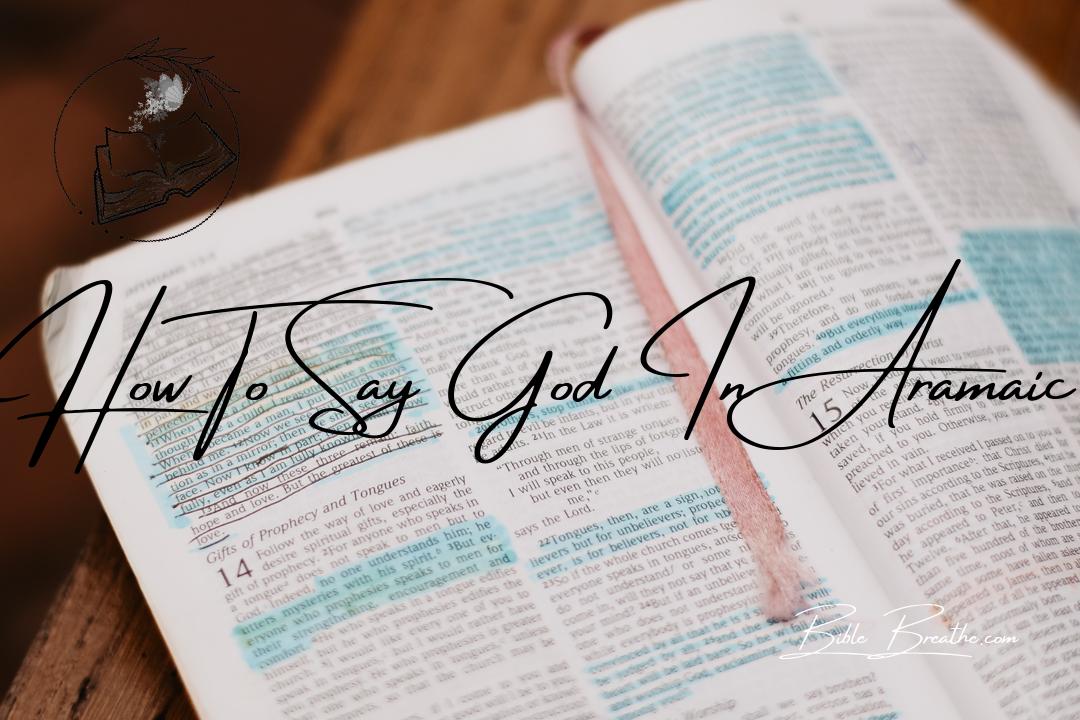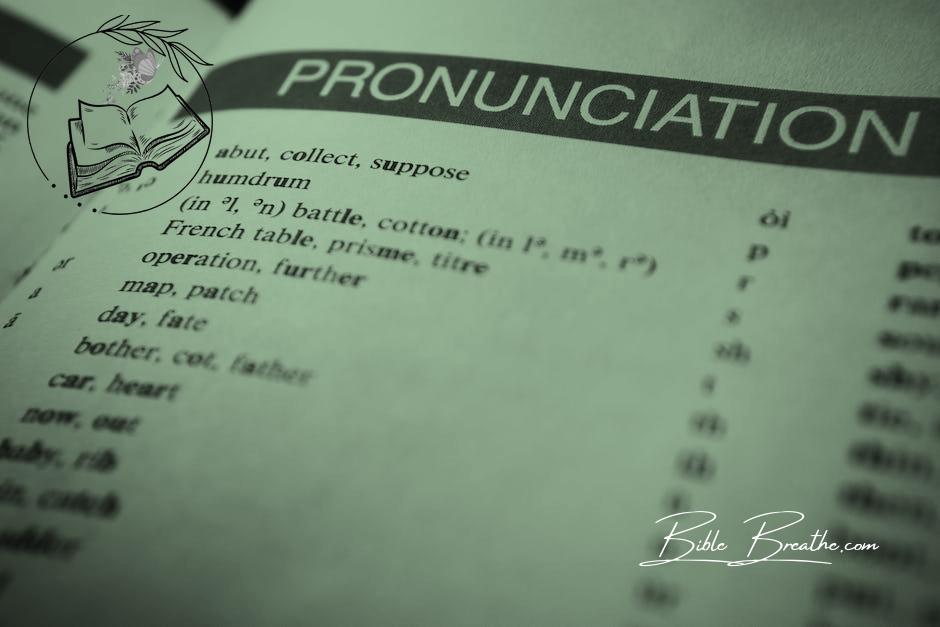Key Takeaways
- The term for “God” in Aramaic has a rich linguistic history. In Aramaic, the word for God is “אלהא” (pronounced as “Elaha” or “Alaha”). This term is notable for its use in various religious and historical contexts, including in the New Testament of the Bible.
- It is important to approach the interpretation of religious texts with contextual understanding. The use of “Elaha” in Aramaic scriptures, such as portions of the Old Testament and the teachings of Jesus, underscores the linguistic diversity of the biblical world. It also highlights the interconnectedness of languages and the influence of Aramaic on the broader Semitic language family.
- Aramaic is part of the Semitic language group, which includes Hebrew and Arabic. These languages share common linguistic roots and have influenced one another over time. The use of “Elaha” in Aramaic, for instance, has parallels in the Hebrew term “Eloah” and the Arabic term “Allah,” all signifying the concept of God.
- Recognizing the linguistic and cultural nuances of religious texts enhances our understanding of the diverse ways in which people have expressed their faith and reverence for the divine across different languages and traditions. It underscores the richness of human spirituality and the common thread that unites people in their search for the divine.
Intro – How to Say God in Aramaic?
Welcome, my friends, to a journey through the ancient echoes of Aramaic, the language that cradled the very words of Jesus.
It’s like discovering hidden treasure buried in the sands of time.
In the heart of Aramaic, we find ‘AaLaH,’ the term for “God” that resonates with profound significance.
It’s the same word that escaped from the lips of our Savior on the cross, “Eloi, Eloi, lama sabachthani.” Now, why is this important, you might wonder?
Well, understanding the roots of ‘AaLaH’ is like unlocking the door to a deeper, more vibrant understanding of the scriptures.
But it’s not just about words; it’s about the essence of our faith.
This exploration is like embarking on a spiritual adventure.
We’re not just studying a language; we’re peering into the very heart of our relationship with the Divine.
And in doing so, we connect with the spiritual tapestry of the Bible, including the Peshitta, the Aramaic translation of the Bible, and its unique significance in our faith journey.
So, let’s dig deep and uncover the meaning of ‘AaLaH’ and how it weaves into our understanding of the Word.
Remember, “In the beginning was the Word,” and we’re here to unravel its profound beauty.🌟
Discovering the Aramaic Whisper: How to Express ‘God’ in Aramaic
Photo modified by BibleBreathe.com. Original photo by Pixabay on Pexels
Aramaic, an ancient Semitic language with tales of old, holds a special seat in the grand story of languages and faith.
Let’s dig into this intriguing language and grasp how to say ‘God’ in Aramaic.
The Ancient Backdrop of Aramaic
Imagine a linguistic saga that weaves through history, and you’re picturing Aramaic.
Once, it was the influential tongue, spreading its influence far and wide, akin to how English does today.
Aramaic’s reach extended across the ancient Near East—regions like modern-day Syria, Iraq, Iran, and Turkey.
Revealing ‘God’ in Aramaic
Now, let’s uncover the expression for ‘God’ in Aramaic.
In this ancient tongue, ‘God’ is known as ‘AaLaH.’ The beauty doesn’t just lie in how it sounds, but in the profound history and spiritual depth packed into this word.
It’s a term interwoven into the very fabric of religious texts and the speeches of Jesus.
In moments of deep distress, Jesus is believed to have called out in Aramaic, saying:
Eloi, Eloi, lama sabachthani“ – Mark 15:34 (KJV)
This heart-wrenching phrase underlines the linguistic roots and spiritual importance that Aramaic carries.
It gives us a glimpse into a time when this language reverberated across ancient landscapes, carrying fervent prayers and timeless teachings.
Aramaic in the Bible and Sacred Writings
Aramaic doesn’t confine itself to everyday conversations; it stretches into sacred scriptures, notably in the Peshitta, the Aramaic rendition of the Bible.
Within these age-old texts, the term ‘God’ is enshrined in the Aramaic lexicon, etching a lasting mark on religious heritage.
As we navigate the linguistic canvas of Aramaic, we don’t just decipher words; we unravel a world where languages were bridges between humanity and the divine.
Understanding ‘God’ in Aramaic: A Linguistic Journey
Photo modified by BibleBreathe.com. Original photo by Nothing Ahead on Pexels
Ever wondered how to speak ‘God’ in the ancient Aramaic tongue, a language close to the heart of Jesus?
‘AaLaH’: The Divine Expression
In Aramaic, ‘God’ is elegantly depicted as ‘AaLaH.’ Picture this: saying ‘Ah-lah,’ you sense a deep spiritual resonance, like a drumbeat echoing through time, a rhythm of reverence in the ancient scriptures.
Did Jesus Spoke of ‘AaLaH’?
Here’s a mind-boggler: Can you imagine Jesus, a fluent Aramaic speaker, using the term ‘AaLaH‘ to reference ‘God’ in his sermons and teachings?
Though historical records can’t shout a definite ‘yes,’ the chances are sky high.
Jesus, embracing Aramaic, likely spoke this sacred term to talk about the divine.
In moments of profound distress, as noted in the Gospels, Jesus cried out in Aramaic:
“Eloi, Eloi, lama sabachthani“ – Mark 15:34 (KJV)
This powerful cry points to the possibility of Jesus using ‘AaLaH’ in his conversations with the divine, underlining Aramaic’s profound influence on expressing spirituality.
As we venture into the rich tapestry of Aramaic, we catch a glimpse of an era where words weren’t mere sounds; they were bridges to faith and spirituality.
‘AaLaH’ remains a timeless echo, reminding us of language’s enduring power to bind humanity with the divine.
God in Aramaic and Arabic: A Linguistic Faceoff
Photo modified by BibleBreathe.com. Original photo by Markus Winkler on Pexels
Let’s take a journey, like a linguistic road trip, comparing how ‘God’ is portrayed in Aramaic with its cousin in Arabic.
We’re diving into the beautiful connections that tie these ancient Semitic languages.
‘AaLaH’ in Aramaic vs. ‘Allahu’ in Arabic
In the Aramaic camp, ‘God’ elegantly steps onto the stage as ‘AaLaH,’ a term dripping with divine vibes.
Now, across the linguistic valley in Arabic, the equivalent echo is ‘Allahu.’ Sure, they dance to different beats in terms of sounds, but the divine resonance is like a family resemblance, linking them together.
It’s like siblings expressing their love for their parent in their own unique ways.
Linguistic Bonds Among Semitic Languages
These Semitic languages—Aramaic, Hebrew, and Arabic—form a sort of linguistic trio, each painting their own picture of ‘God.’
In Hebrew, ‘God’ gets the spotlight as ‘Elohim,’ while in Aramaic, it’s ‘AaLaH,’ and in Arabic, it becomes ‘Allahu.’
They’re like branches of a family tree, distinct yet rooted in the same ancient soil.
The reverence for the divine is a common theme, echoing through the linguistic generations.
To paint a picture, it’s like looking at a family reunion where cousins from different branches gather.
They have unique traits, but that family resemblance is undeniable.
The spiritual connection remains strong, passing down through generations and languages.
As we trek through this linguistic journey, we discover that amidst the diverse sounds of languages, the heart of spirituality remains a strong, unifying beat.
‘AaLaH’ and ‘Allahu’ stand tall, a testament to the enduring faith woven into the fabric of ancient Semitic languages.
Unveiling Jesus’ Cry: “Eloi, Eloi, lama sabachthani” – Grasping Faith’s Echo
Let’s take a ride into the depth of Jesus’ soul as he uttered the haunting words, “Eloi, Eloi, lama sabachthani,” in the Aramaic tongue.
We’re diving into understanding what these words mean, not just linguistically, but spiritually, in the tapestry of faith.
The Cry “Eloi, Eloi, lama sabachthani”: A Deeper Look
Imagine the scene: Jesus, amidst immense anguish, pours out in Aramaic:
“Eloi, Eloi, lama sabachthani“ – Mark 15:34 (KJV)
In English, these soul-piercing words translate to “My God, My God, why hast thou forsaken me?”
These words don’t just tell of Jesus’ pain; they paint a picture of faith grappling with suffering, a canvas of human struggle with the divine amidst the darkest hours.
Layers of Meaning
These words echo beyond the crucifixion, resonating across religious texts.
They carve into the core of the human experience.
In the face of agonizing suffering, it’s a cry of raw vulnerability, mirroring the very essence of being human.
It’s a deep, honest conversation with the divine—a fusion of desperation and unshakeable faith.
Moreover, this phrase illuminates the roots of Aramaic, the language Jesus embraced.
It underscores the profound bond between words and spirituality, showcasing how the words we choose can encapsulate the depth of our connection with the divine.
As we unravel the layers of these words, we catch a glimpse of Jesus’ heart, a window into the human soul.
It urges us to ponder our own moments of doubt and belief, reminding us that even in the abyss of despair, the divine is present, echoing through time in Jesus’ Aramaic cry.
Frequently Asked Questions (FAQs) About How To Say God In Aramaic
Did Jesus predominantly use the term ‘AaLaH’ in his speeches?
No, Jesus did not predominantly use the term ‘AaLaH’ in his speeches.
Instead, he primarily used the term ‘God’ or ‘Father’ when referring to the divine being.
How does the Aramaic term for God compare to its counterparts in Hebrew and Arabic?
The Aramaic term for God, ‘Alaha’ or ‘Eil,’ is similar to the Hebrew term ‘Eloah’ and the Arabic term ‘Allah.’ These languages share common Semitic roots, so their words for God have linguistic similarities, reflecting the monotheistic faith that transcends these cultures.
What is the significance of understanding the Aramaic term for God in modern religious studies?
The Aramaic term for God, ‘Elohim’ or ‘Elah,’ provides linguistic and historical insights.
Understanding these terms enriches modern religious studies by offering a linguistic bridge to the ancient texts, unveiling cultural contexts and shedding light on the nuances of biblical meaning, thereby enhancing theological comprehension.




